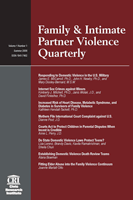Reforming the Role of the Convening Authority in the Military Justice System
Author: Cassandra Dodge.; Ráchael A. Powers.; Jacqueline Leon.
Source: Volume 15, Number 02, Fall 2022 , pp.79-90(12)

< previous article |next article > |return to table of contents
Abstract:
As is the case in the civilian community, within the military, sexual assaults are grossly underreported. Complicating efforts to achieve recompense for military sexual assault victims are the stark differences between the operations of civilian justice system and the justice system under which the military operates—the Uniform Code of Military Justice (UCMJ). As these authors succinctly note, within the military, one of the major contributors to the problem of effectively prosecuting sexual assault crimes is the role of the convening authority—that is, the person responsible for the disposition of such charges. Within the military branches, the convening authority is the unit commander, who holds authority over every military member within his chain of command. And herein lies the problem: the authors argue against the use of these commanders in the handling of serious crimes, such as sexual assaults, citing a host of problems with this role: for example, the unit commander may lack legal expertise, may be biased in favor of or against the accused or the victim, or may have the power to exercise undue influence over those providing testimony.Keywords: : Uniform Code of Military Justice (UCMJ); Article 32 Hearing; Inconsistencies In Application; Proposed Legislative Reforms
Affiliations:
1: Georgia Southern University; 2: University of South Florida; 3: University of South Florida.